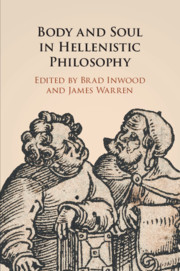Book contents
- Body and Soul in Hellenistic Philosophy
- Body and Soul in Hellenistic Philosophy
- Copyright page
- Contents
- Contributors
- Abbreviations
- Introduction
- Chapter 1 Hellenistic Medicine, Strato of Lampsacus, and Aristotle’s Theory of Soul
- Chapter 2 Herophilus and Erasistratus on the Hēgemonikon
- Chapter 3 Galen on Soul, Mixture and Pneuma
- Chapter 4 The Partition of the Soul
- Chapter 5 Cosmic and Individual Soul in Early Stoicism
- Chapter 6 Soul, Pneuma, and Blood: The Stoic Conception of the Soul
- Chapter 7 The Platonic Soul, from the Early Academy to the First Century ce
- Chapter 8 Cicero on the Soul’s Sensation of Itself: Tusculans 1.49–76
- Bibliography
- Index Locorum
- Subject Index
Chapter 3 - Galen on Soul, Mixture and Pneuma
Published online by Cambridge University Press: 20 May 2020
- Body and Soul in Hellenistic Philosophy
- Body and Soul in Hellenistic Philosophy
- Copyright page
- Contents
- Contributors
- Abbreviations
- Introduction
- Chapter 1 Hellenistic Medicine, Strato of Lampsacus, and Aristotle’s Theory of Soul
- Chapter 2 Herophilus and Erasistratus on the Hēgemonikon
- Chapter 3 Galen on Soul, Mixture and Pneuma
- Chapter 4 The Partition of the Soul
- Chapter 5 Cosmic and Individual Soul in Early Stoicism
- Chapter 6 Soul, Pneuma, and Blood: The Stoic Conception of the Soul
- Chapter 7 The Platonic Soul, from the Early Academy to the First Century ce
- Chapter 8 Cicero on the Soul’s Sensation of Itself: Tusculans 1.49–76
- Bibliography
- Index Locorum
- Subject Index
Summary
Galen of Pergamum (129–215 ce), the influential Greek doctor and philosopher, had much to say about the soul and its relationship to the body. In developing his views on psychophysical interaction, Galen used and combined ideas and concepts derived from the philosophical traditions of Platonism, Aristotelianism, and Stoicism. He also took medical views on board, ranging from the earliest fifth-century bce writings of ‘Hippocrates’, the fourth-century doctor Diocles of Carystus, and Hellenistic medical writers such as Herophilus and Erasistratus, to the works of his older medical contemporaries, such as Rufus of Ephesus and the Pneumatist writer Archigenes of Apamea; these were especially relevant when it came to the anatomy and physiology of the soul and the diagnosis and treatment of mental disorder in its somatic aspects.
- Type
- Chapter
- Information
- Body and Soul in Hellenistic Philosophy , pp. 62 - 88Publisher: Cambridge University PressPrint publication year: 2020
- 5
- Cited by

